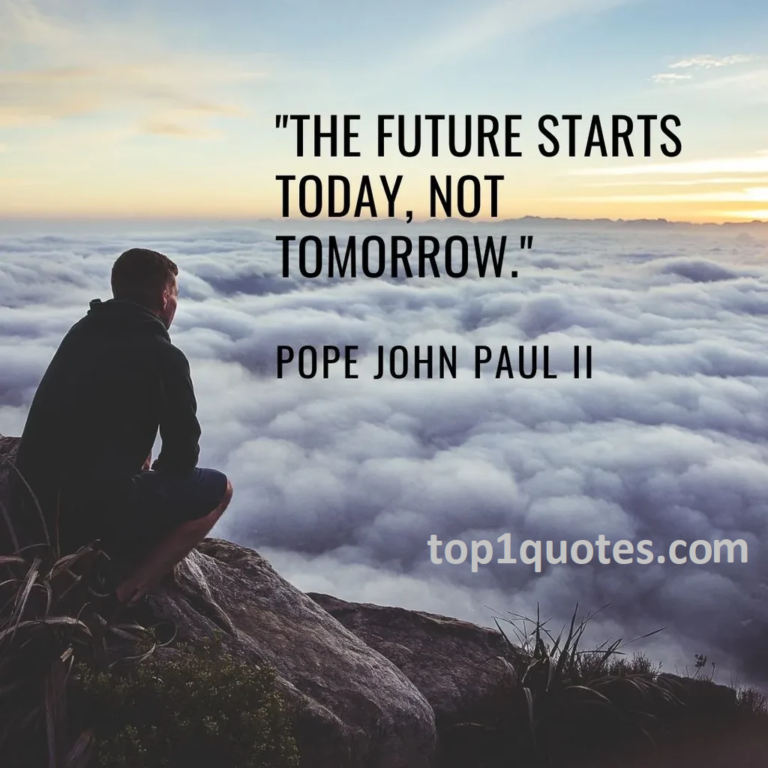 MOTIVATIONAL QUOTE FOR WORK
MOTIVATIONAL QUOTE FOR WORK
-
Future Starts The From Today, Not Tomorrow
The quote, “The future starts from today, not tomorrow,” is a concise yet profoundly motivating reminder that every step we take in life begins in the present. This phrase underscores the importance of action, mindfulness, and the role of today in shaping tomorrow. It serves as a powerful call to embrace the now, make the most of it, and build the foundation of the future we desire. To unpack its meaning fully, let’s delve into its layers, exploring the implications it holds for personal growth, societal progress, and the philosophy of time.
MOTIVATIONAL QUOTE FOR WORK
Every moment is fleeting, yet each one is a building block for what lies ahead. The essence of this quote lies in its rejection of procrastination and its embrace of immediacy. Often, people fall into the trap of thinking, *”I’ll start tomorrow,”* or *”I’ll handle it later.”* Such thoughts can lead to stagnation, as the indefinite “tomorrow” keeps us from taking tangible steps forward.
The truth is, the only moment we can ever truly influence is the present. Today’s decisions, actions, and thoughts are the threads weaving the tapestry of our future. For instance, consider a student aspiring to excel in their studies. If they constantly defer studying to “tomorrow,” they miss the chance to accumulate knowledge, build skills, and prepare for exams. It is their efforts today that will create the academic achievements of tomorrow.
—
-
A Reminder of Responsibility
This quote also carries a sense of accountability. By stating that the future starts from today, it positions each individual as the architect of their destiny. While external circumstances undeniably influence our lives, our responses to these circumstances are within our control. This means taking responsibility for our actions—or inactions—each day.
For example, in the context of climate change, waiting for “tomorrow” to reduce carbon emissions or adopt sustainable practices could lead to irreversible damage. Collective action begins with the choices made today—whether it’s switching to renewable energy, reducing waste, or supporting green initiatives. Each of these decisions contributes to a more sustainable future.
—
- Overcoming Procrastination
Procrastination is a common human tendency, fueled by fear of failure, a lack of motivation, or an overwhelming task. “The future starts from today, not tomorrow” is a gentle yet firm nudge to combat this habit. Instead of waiting for the elusive “perfect time,” it encourages us to take small, meaningful steps now.
Starting can feel daunting, especially when a goal seems monumental. Take the example of someone aiming to write a book. The idea of completing an entire manuscript might feel overwhelming, but writing a single paragraph today sets the process in motion. Small, consistent actions accumulate over time, transforming ambition into reality. This quote reminds us.
-
The Future Starts From Today, Not Tomorrow
The quote, *”The future starts from today, not tomorrow,”* is a powerful reminder of the significance of the present moment in shaping what is to come. Its simplicity belies the profound wisdom it holds: our actions today are the seeds from which the fruits of tomorrow will grow. This statement encourages a mindset of proactivity, self-discipline, and mindfulness. It challenges the widely held notion that the future is something distant and detached, instead urging us to recognize that the choices and actions we take right now set the trajectory of our lives. By reflecting on this quote in depth, we uncover layers of insight about time, personal growth, and the necessity of taking responsibility for our lives.
—
Living in the Present: The Only Moment We Truly Have
At its core, the quote emphasizes the importance of living in and valuing the present moment. Life unfolds one second at a time, and while we often dwell on the past or worry about the future, the present is the only moment we can act upon. The future is not a fixed destination that will arrive unbidden; it is something we continuously create through our present actions, decisions, and attitudes.
Imagine a garden. A gardener cannot expect flowers to bloom tomorrow if they do not plant seeds and water them today. Similarly, our future is cultivated by the actions we take here and now. If we procrastinate, avoid action, or neglect our responsibilities, we are essentially neglecting the soil where tomorrow’s flowers might grow.
This idea resonates deeply with philosophies of mindfulness and intentionality. To “be present” means to give your full attention to the task or moment at hand, acknowledging that the cumulative effect of your focus and effort will determine your future. Whether it is building a career, nurturing a relationship, or pursuing a dream, the progress you seek begins with the steps you take today.
MOTIVATIONAL QUOTE FOR WORK
The Trap of Tomorrow: Avoiding Procrastination
The concept of “tomorrow” is often synonymous with procrastination. Many of us are guilty of saying, *“I’ll start tomorrow,”* whether it’s about starting a fitness routine, saving money, learning a new skill, or tackling a difficult task. While this thought might seem harmless, it often creates a cycle of delay that leaves us perpetually waiting for a “perfect” moment that never arrives.
This cycle can be detrimental. For instance, someone might dream of writing a book but continually puts it off, thinking they’ll have more time or energy in the future. Weeks turn into months, and months turn into years, and the dream remains unrealized. The future they imagined was never given a chance to materialize because the critical first steps were never taken.
The quote is a reminder that *today* is the ideal time to begin. Even small, imperfect actions are infinitely more valuable than grand intentions left unrealized. Every step taken today moves us closer to our goals, while waiting for “tomorrow” only ensures that we remain stagnant.
—
Building Habits That Shape the Future
The future is not just about grand plans; it is also about the habits we cultivate. Small, consistent actions taken today accumulate over time to create significant change. Consider someone aiming to achieve physical fitness. The decision to exercise for even 20 minutes a day may seem small, but over weeks and months, it leads to improved strength, health, and well-being.
Habits are the bridge between the present and the future. When we make a conscious effort to adopt positive routines, we are effectively investing in our future selves. Conversely, neglecting the present by engaging in negative habits or postponing positive ones builds a future that reflects those choices.
The wisdom in this quote lies in its ability to highlight that the path to a better future is paved with consistent, intentional actions. There is no shortcut or magical leap from today to tomorrow; progress requires daily effort and commitment.
—
- The Role of Mindset: Overcoming Fear and Inertia
One of the barriers to embracing the present is fear. Many people hesitate to act today because they fear failure, rejection, or uncertainty. They might think, *”I’m not ready yet,”* or *”I need more time to prepare.”* However, this hesitation often becomes an excuse to avoid stepping out of their comfort zones.
The truth is, waiting for the “perfect moment” is a myth. Perfection is an illusion, and waiting for ideal circumstances only leads to missed opportunities. By acting today, even in the face of fear or uncertainty, we begin to develop the resilience and confidence necessary to navigate challenges. Every small action builds momentum, and momentum is often the key to overcoming inertia.
—
- Time as a Finite Resource
Another important layer of this quote is its acknowledgment of time as a finite resource. We often take time for granted, assuming there will always be another chance, another day, another opportunity. Yet, the reality is that time moves relentlessly forward, and every day we delay is a day we cannot get back.
Recognizing the value of today is a way of honoring the gift of time. It prompts us to prioritize what truly matters, focus on our goals, and avoid distractions that pull us away from meaningful pursuits. Whether it’s spending time with loved ones, pursuing a passion, or contributing to a cause, the present is the only time we have to make those moments count.
—
- Impact on Society: Collective Action Today for a Better Tomorrow
While the quote is often interpreted on a personal level, it also holds profound implications for society as a whole. Many of the challenges we face—climate change, inequality, and public health crises—require immediate action. Waiting for “tomorrow” to address these issues only exacerbates them.
For example, combating climate change requires collective efforts today. Sustainable practices, technological innovations, and policy changes need to happen now if we hope to mitigate future consequences. The same applies to social justice: creating a more equitable world depends on the actions we take today to challenge injustice and promote fairness.
The future we envision—a healthier planet, a more just society, a thriving global community—starts with the choices and actions we collectively take in the present. This quote serves as a rallying cry for urgency and responsibility.
—
- Conclusion: Embracing the Present to Shape the Future
*“The future starts from today, not tomorrow”* is more than a motivational phrase; it is a guiding principle for life. It reminds us that the future is not a distant dream but an ongoing creation, built one moment at a time. By focusing on today—by acting, learning, and growing—we actively shape the path that lies ahead.
This quote challenges us to take ownership of our lives and reject the allure of procrastination. It inspires us to embrace the present with courage and determination, knowing that the small steps we take today will lead to the achievements, experiences, and outcomes we desire in the future.
Ultimately, the message is simple but profound: the future is not something we wait for; it is something we create. And that creation begins here and now—with the choices we make, the actions we take, and the lives we live, today.



 MOTIVATIONAL QUOTE FOR WORK
MOTIVATIONAL QUOTE FOR WORK
 URDU QUOTES ON LIFE
“تمھا ری تقدیر تمھا رے ھاتھ میں ھے”: A Deep Dive
Translation and Literal Meaning
The Urdu phrase “تمھا ری تقدیر تمھا رے ھاتھ میں ھے” translates directly to “Your destiny is in your hands.” This simple yet profound statement encapsulates a powerful message about personal agency and the role of individual choice in shaping one’s life.
A Philosophical Exploration
At its core, this phrase challenges the notion of predestination and fatalism. It posits that individuals are not mere pawns in a cosmic game, but rather active participants in the creation of their own destinies. This perspective aligns with various philosophical schools of thought:
* Existentialism: This philosophy emphasizes individual freedom and responsibility. It suggests that individuals are the authors of their own lives, and that their choices and actions define their essence.
* Humanism: This philosophy centers on human potential and agency. It encourages individuals to take control of their lives and strive for self-improvement.
* Positive Psychology: This field of psychology focuses on the strengths and virtues of individuals. It emphasizes the power of positive thinking, goal-setting, and perseverance in shaping one’s life.
Cultural and Religious Perspectives
The concept of individual agency and destiny is explored in various cultural and religious contexts:
* Islam: While Islamic theology acknowledges divine predestination, it also emphasizes the importance of individual effort and striving. The Quran often encourages believers to work hard and seek knowledge, suggesting that their actions can influence their outcomes.
* Hinduism: The concept of karma, or the law of cause and effect, is central to Hindu philosophy. It suggests that individuals create their own destinies through their actions and thoughts.
* Buddhism: Buddhism emphasizes the importance of mindfulness and conscious action. It teaches that individuals can liberate themselves from suffering through their own efforts.
Practical Implications
The belief that one’s destiny is in their own hands has significant practical implications:
* Empowerment: This belief can empower individuals to take control of their lives and pursue their dreams. It encourages them to think positively, set goals, and take action.
* Resilience: By understanding that they have the power to shape their own destinies, individuals can develop resilience in the face of adversity. They can view challenges as opportunities for growth and learn from their mistakes.
* Personal Responsibility: This belief promotes a sense of personal responsibility. It encourages individuals to take ownership of their choices and actions, and to avoid blaming external factors for their circumstances.
The Role of Mindset
A key factor in shaping one’s destiny is mindset. A growth mindset, characterized by a belief in one’s ability to learn and grow, is essential for success. Individuals with a growth mindset are more likely to embrace challenges, persevere through setbacks, and learn from their mistakes.
Conclusion
The phrase “تمھا ری تقدیر تمھا رے ھاتھ میں ھے” is a powerful reminder that individuals have the ability to shape their own destinies. By embracing a growth mindset, taking responsibility for their actions, and persevering through challenges, individuals can unlock their full potential and crea
URDU QUOTES ON LIFE
“تمھا ری تقدیر تمھا رے ھاتھ میں ھے”: A Deep Dive
Translation and Literal Meaning
The Urdu phrase “تمھا ری تقدیر تمھا رے ھاتھ میں ھے” translates directly to “Your destiny is in your hands.” This simple yet profound statement encapsulates a powerful message about personal agency and the role of individual choice in shaping one’s life.
A Philosophical Exploration
At its core, this phrase challenges the notion of predestination and fatalism. It posits that individuals are not mere pawns in a cosmic game, but rather active participants in the creation of their own destinies. This perspective aligns with various philosophical schools of thought:
* Existentialism: This philosophy emphasizes individual freedom and responsibility. It suggests that individuals are the authors of their own lives, and that their choices and actions define their essence.
* Humanism: This philosophy centers on human potential and agency. It encourages individuals to take control of their lives and strive for self-improvement.
* Positive Psychology: This field of psychology focuses on the strengths and virtues of individuals. It emphasizes the power of positive thinking, goal-setting, and perseverance in shaping one’s life.
Cultural and Religious Perspectives
The concept of individual agency and destiny is explored in various cultural and religious contexts:
* Islam: While Islamic theology acknowledges divine predestination, it also emphasizes the importance of individual effort and striving. The Quran often encourages believers to work hard and seek knowledge, suggesting that their actions can influence their outcomes.
* Hinduism: The concept of karma, or the law of cause and effect, is central to Hindu philosophy. It suggests that individuals create their own destinies through their actions and thoughts.
* Buddhism: Buddhism emphasizes the importance of mindfulness and conscious action. It teaches that individuals can liberate themselves from suffering through their own efforts.
Practical Implications
The belief that one’s destiny is in their own hands has significant practical implications:
* Empowerment: This belief can empower individuals to take control of their lives and pursue their dreams. It encourages them to think positively, set goals, and take action.
* Resilience: By understanding that they have the power to shape their own destinies, individuals can develop resilience in the face of adversity. They can view challenges as opportunities for growth and learn from their mistakes.
* Personal Responsibility: This belief promotes a sense of personal responsibility. It encourages individuals to take ownership of their choices and actions, and to avoid blaming external factors for their circumstances.
The Role of Mindset
A key factor in shaping one’s destiny is mindset. A growth mindset, characterized by a belief in one’s ability to learn and grow, is essential for success. Individuals with a growth mindset are more likely to embrace challenges, persevere through setbacks, and learn from their mistakes.
Conclusion
The phrase “تمھا ری تقدیر تمھا رے ھاتھ میں ھے” is a powerful reminder that individuals have the ability to shape their own destinies. By embracing a growth mindset, taking responsibility for their actions, and persevering through challenges, individuals can unlock their full potential and crea

 motivational quotes
Mahatma Gandhi’s quote, “Be the change that you wish to see in the world,” resonates deeply across cultures and generations. This simple yet profound statement encapsulates a powerful philosophy: personal accountability and proactive engagement in creating the desired transformation in society. At its core, this quote encourages individuals to embody the values and changes they wish to witness, fostering a cycle of positive influence and inspiring others to do the same.
motivational quotes
Mahatma Gandhi’s quote, “Be the change that you wish to see in the world,” resonates deeply across cultures and generations. This simple yet profound statement encapsulates a powerful philosophy: personal accountability and proactive engagement in creating the desired transformation in society. At its core, this quote encourages individuals to embody the values and changes they wish to witness, fostering a cycle of positive influence and inspiring others to do the same.


